Sustainability Grants

ACS Sustainable Futures Initiative Grant Program
The ACS Campaign for a Sustainable Future aims to advance chemistry innovations to address the challenges articulated in the U.N. Sustainable Development Goals. This multifaceted initiative will have lasting impact on how we conduct research, how we teach chemistry, and how we collaborate globally. The initiative begins with a campaign to fully engage the chemistry community in designing solutions to the grand challenges of sustainability, reimagining how we teach and practice chemistry with a sustainability focus, and raising public awareness among about chemistry’s role in a sustainable future. One of the key initiatives of the Campaign is a grant program, which aims to provide catalytic funding for early and mid-career faculty interested in developing a research and teaching portfolio that contributes directly to developing transformative chemistries that address Sustainable Development Goals.
Grants for Faculty & Postdoc Research
Early Career Postdoctoral-Faculty Bridge Grant
For post-doctoral associates applying for faculty positions or faculty in the first 9 months of an appointment at Ph.D.-granting colleges and universities. Two years of funding to launch an independent research group.
Principal Investigator Development in Sustainability Grant
For early or mid-career investigators from Ph.D.-granting departments expecting to undertake a sabbatical the following year.
Inaugural ACS Early Career Postdoctoral-Faculty Bridge Grant Winners
Congratulations to the ECP Grant winners! Read The Nexus article for more on the winners enthusiasm to bring green chemistry to their students.
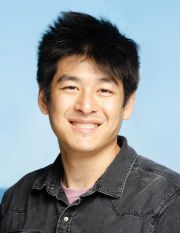
Postdoctoral Scholar
Northwestern University
Advisor: Sossina M. Haile
Arthur Shih completed his postdoctoral research at the Materials Science and Engineering Department at Northwestern University under Professor Sossina M. Haile. Previously, he was a postdoctoral fellow at Universiteit Leiden under chemistry professor Marc T.M. Koper. Shih received his Ph.D. in Chemical Engineering from Purdue University and his B.S.E. in Chemical Engineering at the University of Michigan.
Electrochemical Refinement of Recycled Iron via Selective Copper Dissolution
“Enabled by a sharp decrease in the cost of renewable electricity, electrochemistry has become one of many promising solutions in the transition towards a robust and equitable circular economy. My future research group will study how thermal-electrochemistry can enable the commercialization of sustainable technologies, shifting society’s dependence from fossil resources towards air, water, waste, and biomass. Our approach involves the synthesis of well-defined materials to elucidate chemical mechanisms using kinetic probes.”
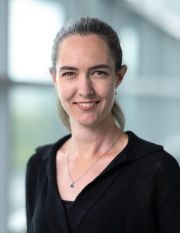
Assistant Professor of Chemistry
Brandeis University
Before joining the faculty at Brandeis in July 2023, Katherine Shulenberger was a postdoctoral researcher under Prof. Gordana Dukovic at the University of Colorado Boulder. During the 2021–2022 academic year, her work was funded through the Cottrell Postdoctoral Fellowship. Katherine completed her doctoral work in the Bawendi and Tisdale groups at the Massachusetts Institute of Technology in September 2019.
Heavy Metal-Free Nanocrystals for Clean Energy Generation
“The development of materials for renewable energy generation is of the utmost importance in addressing current environmental challenges facing our society. Semiconductor nanocrystals show promise in addressing this challenge. However, current state-of-the-art materials for both photovoltaic and photocatalytic applications suffer from drawbacks such as the use of toxic or scarce metals. Therefore, there is a need to both develop and understand earth-abundant and nontoxic nanocrystal materials. In the Shulenberger lab, we develop and adapt optical characterization techniques that can unravel the properties of nanocrystal films in device-relevant environments. We utilize both single-particle correlation measurements and ultrafast optical characterization to bridge the gap between existing ensemble and single-particle techniques. We apply these strategies to understand fundamental material properties of nanocrystals derived from sustainable materials."
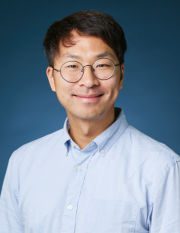
Assistant Professor of Chemical Engineering
Rowan University
Jun Hee Jang is an assistant professor in the Department of Chemical Engineering at Rowan University. He earned a B.S. in chemical engineering at Korea University (South Korea) and an M.S. in the same field at Seoul National University (South Korea). He received his Ph.D. in chemical engineering from the University of California, Santa Barbara (UCSB). Before his faculty appointment, he worked as a postdoctoral research associate at the National Renewable Energy Laboratory (NREL) with his advisor, Dr. Gregg T. Beckham.
Product Circulation Strategy for Enhanced Economics and Sustainability in Biorefineries of Waste Resources
“Our research focuses on designing efficient and economically viable catalytic processes to convert various carbon resources into sustainable fuels and chemicals. The research program encompasses three key areas: 1) designing and synthesizing catalytic materials; 2) applying advanced analytical techniques; and 3) designing and optimizing processes from economic and environmental perspectives. The work proposed under the ACS Early Career Postdoctoral-Faculty Bridge Grant includes the concept of material and energy circulation, wherein product streams are repurposed for biorefining waste substrates by employing appropriate chemistry and catalysis.”

Postdoctoral Researcher
Woods Hole Oceanographic Institution
Advisor: Christopher Reddy
Bryan James is a postdoctoral researcher working under advisor Dr. Christopher Reddy at the Woods Hole Oceanographic Institution, jointly appointed in the Department of Marine Chemistry and Geochemistry and the Department of Biology. In May 2021, he received his Ph.D. in materials science and engineering from the University of Florida and was an NIH predoctoral fellow. He received his B.A.Sc. in materials engineering from the University of Toronto.
The Rationale Design of Nucleic Acids for Use as Multifunctional, Green Additives in Next-Generation Plastics
“I study the fate, persistence, and toxicity of plastic pollution in the ocean to inform the design of next-generation materials that are safe for people and the planet. My research involves designing and applying instrumentation for evaluating environmental degradation, assessing chemical and material toxicity using in vitro and in vivo bioassays, and developing tools and strategies to inform decision-making in product design.”

Assistant Professor
Columbia University
Neil obtained his B.S. in materials science and engineering from Rutgers University, where he studied gold nanoparticle synthesis in the lab of Laura Fabris. After graduating, Neil joined the Materials Department at the University of California Santa Barbara, in pursuit of his Ph.D. under the supervision of Craig Hawker. Before starting his new role as Assistant Professor at Columbia University, Neil worked as a postdoctoral researcher at the University of Chicago under advisor Dr. Stuart Rowan.
Enhancing Plastic Waste Recycling with Reconfigurable Dynamic Polymers
“My research focuses on the preparation of dynamic, reconfigurable polymers. By manipulating external cues, our group hopes to control the assembly characteristics of such dynamic polymers giving rise to materials that can exhibit large ranges of properties depending on their processing history, vastly expanding end-of-life options. In particular, the group sees opportunities in deploying such dynamic polymers as compatibilizers for immiscible blends of commodity polymers, enhancing efforts in recycling plastic waste.”
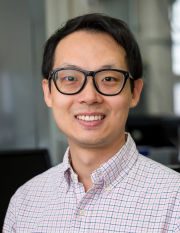
Postdoctoral Research Associate
University of Wisconsin-Madison
Advisor: George W. Huber
Houqian obtained his B.S. in chemistry from Nankai University in 2016. After graduating, he joined the Chemical Engineering Department at Washington State University in pursuit of his Ph.D. and worked as a graduate research assistant under his advisor, Prof. Yong Wang. At the University of Wisconsin-Madison, working under Prof. George W. Huber, Houqian has continued his career as a postdoctoral research associate.
Tuning Chain Length of Alkenes in Plastic Oil with Catalytic Metathesis
“The linear economy has led to sustainability challenges that could be potentially addressed by producing chemicals, materials, and fuels from waste. The obstacles are the distributed and complex nature of the waste and, more importantly, how to bridge lab-scale discoveries to practical applications. My research leverages information at both the molecular and system levels, which will facilitate the transition towards a circular economy.”
Principal Investigator Development in Sustainability (PISD) Grant Winners
Congratulations to the PISD Grant winners! Grant recipients benefit from a 6–12 month sabbatical at a hosting institution that they have intentionally selected as a means to acquire new knowledge that will advance their sustainability research. Read about their research projects and the innovative, cross-sector collaborations this opportunity will create over the coming months.
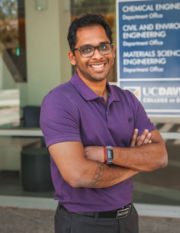
Assistant Professor
University of California, Davis
Project: Revolutionizing the Transportation Industry using Liquid Organic Hydrogen Carriers
Sabbatical Host Institution: Technical University of Denmark, Department of Physics. This sabbatical will enable a long-term collaboration that combines Ambarish's core expertise in multi-scale modeling and data science with broader impacts to real-world sustainability challenges in energy and transportation.
“Sustainability, especially in our everyday actions, has always been important to me. Given my background in using molecular modeling to study fuel cell catalysts, I was really excited to drive the Mirai, which is Toyota's flagship hydrogen fuel cell vehicle (H2-FCEV). Although impressed by the car, I soon realized that the key bottleneck preventing widespread adoption of H2-FCEVs is the fledgling H2 infrastructure in California. This prompted me to explore liquid organic hydrogen carriers (LOHCs), the focus of this project, as a potential solution to this problem. As part of my CleanTech elective, I now use this experience to emphasize the importance of focusing on the "right" problem within the broad spectrum of emerging green technologies.

Associate Professor
University of Illinois Urbana-Champaign
Project: Visualizing Nanoscale 3D Ion and Defect Chemical Kinetics in Sustainable Energy Materials and Devices: Advancing Tandem Isotope Exchange Tomography and Spectrometry
Sabbatical Host Institution: Imperial College London, Department of Materials. By spending her sabbatical working alongside the Skinner Research Group - a world leader in materials for energy technologies - Nicola will have the opportunity to learn new techniques and bring them back to her group in the US.
“My interest in sustainability led me to research solid state ionics. This class of materials enables clean electrochemical energy conversion and storage applications, including fuel cells for zero-pollution electricity generation, all-solid-state batteries, and electrolyzers for green H2 production. My research develops design principles, operando characterization tools, and materials discovery strategies to enhance carbon-neutral device efficiency and lifetime. To equip students with the scientific foundation to understand materials design and operation in clean energy technologies, I have developed a “Solid State Ionics” course. Moving forward I hope to include lessons from my research collaborations on life-cycle-analysis (including environmental and health impacts) and co-design for recyclability.”
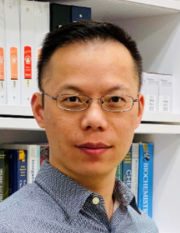
Associate Professor
University of Cincinnati
Project: Developing Green Electro/Photo-Enzymatic Catalysis for Sustainable Organic Synthesis
Sabbatical Host Institution: Princeton University, Department of Chemistry. Yujie’s sabbatical will give him the opportunity to extend his work in establishing electro-enzymatic reactor techniques with a research group (led by Dr. Michelle C. Chang) that focuses on how enzymes and metabolic pathways function to provide new avenues for engineering function.
“Green chemistry and sustainability principles have fundamentally guided my research in electrocatalysis and photocatalysis. Our research projects emphasize the development of efficient and low-cost processes using renewable materials, directly addressing the urgent need for environmentally benign solutions in chemical synthesis and energy conversion. To educate students on the importance of green chemistry, I have developed a new course, CHEM 3050: Green Chemistry and Sustainability, which is designed for a broad audience including non-chemistry majors. It highlights the critical role of sustainable practices in scientific research and industry, fostering an interdisciplinary understanding of green chemistry principles and their application in addressing global challenges.”
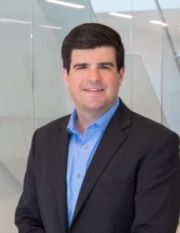
Associate Professor
Case Western Reserve University
Project: Sustainable Formulation of Packaging Materials: Films, Packaging, and Coatings
Sabbatical Host Institution: Dow Chemical Company. The PISD grant will enable a long-term academia-industry collaboration focusing on enhancing the sustainable chemical formulation of products and their manufacturing processes.
“Research questions driven by green chemistry and sustainability have become more prominent in our group in recent years. Our fundamental expertise in Colloidal and Interfacial Phenomenon, Complex Fluids Engineering, and Rheology are used to answer these questions, especially as they relate to formulation engineering and processing of chemical products. My future educational efforts will feature stronger connections about how sustainability drives formulation choice, for instance in switching a synthetic additive for a natural one in a consumer product, using recycled feedstocks in a film, or reducing solvent in a coating, and impacts processibility and performance of the material.”
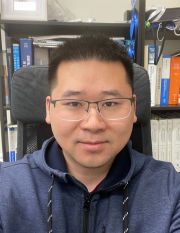
Assistant Professor
University of California Santa Barbara
Project: Sustainable Photobiocatalytic Synthesis of Non-Canonical Amino Acids Under Continuous Flow Conditions
Sabbatical Host Institution: Genentech, Inc. This academia-industry collaboration will enable Yang to explore challenges and opportunities with transitioning his research group’s photobiocatalytic technology into the chemical industry.
“By integrating chemistry, biology, and artificial intelligence, the Yang laboratory is developing novel biocatalytic strategies to tackle daunting challenges in synthesis, catalysis and materials science. First, we are addressing long-standing problems in asymmetric catalysis by taking advantage of the intimate enzyme-substrate interaction that can be easily tuned via directed evolution. Second, by synergistically merging small-molecule catalysis and biocatalysis, we are advancing novel enzymatic processes that are both new-to-biology and new-to-chemistry. Third, we are developing machine learning and automation methods to accelerate the development of customized biocatalysts with tailored applications.”

